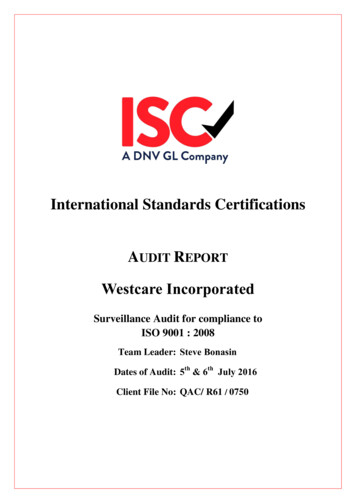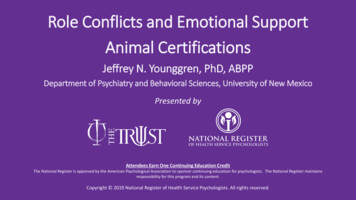
Transcription
UNCLASSIFIEDTLP:WHITECertifications in the Field of CyberSecurity2020TLP:WHITE
UNCLASSIFIEDTLP:WHITEFOREWORDThe Certifications in the Field of Cyber Security is an UNCLASSIFIED publication. The guide provides information about manyof the certifications available for prospective students and cyber security professionals. The intent is not to recommend anycertification body or certification in particular, but to provide a listing of some of the different certifications that may helpadvance an individual’s career in the field of cyber security.Information is sourced from the websites of the certification bodies referenced in this guide.Disclaimer: The Communications Security Establishment does not endorse or recommend any of the certification bodiesor certifications listed in this document. Information provided is intended to be a general summary of publicly availableinformation and is provided for informational purposes only.REVISION HISTORYRevisionAmendmentsDate1First releaseNovember 2020Disclaimer: The Communications Security Establishment does not endorse or recommend any of the certification bodies or certifications listed in thisdocument. Information provided is intended to be a general summary of publicly available information and is provided for informational purposes only.
UNCLASSIFIEDTLP:WHITETABLE OF CONTENTS1.0Introduction . 42.0Globally Recognized Certifications Bodies . 53.0Cyber Security Certification Listings and Descriptions.11LIST OF TABLESTable 1CertNexus Certification Listing and Descriptions .11Table 2Cisco Systems Certification Listing and Descriptions .14Table 3CompTIA Certification Listing and Descriptions .15Table 4CREST Certification Listing and Descriptions .18Table 5CWNP Certification Listing and Descriptions .20Table 6EC Council Certification Listing and Descriptions .22Table 7GIAC Certification Listing and Descriptions .29Table 8(ISC)2 Certification Listing and Descriptions.41Table 9ISACA Certification Listing and Descriptions.44Table 10itSM Solutions Certification Listing and Descriptions .47Table 11McAfee Institute Certification Listing and Descriptions .48Table 12Offensive Security Certification Listing and Descriptions .50Table 13SECO Institute Certification Listing and Descriptions.53Disclaimer: The Communications Security Establishment does not endorse or recommend any of the certification bodies or certifications listed in thisdocument. Information provided is intended to be a general summary of publicly available information and is provided for informational purposes only.
UNCLASSIFIEDTLP:WHITE1.0 INTRODUCTIONThere continues to be a growing demand for qualified cyber security professionals and practitioners in Canada and aroundthe world. With the increasing need for cyber security professionals, the value of IT certification is also increasing. The rightcertification can give you an advantage over other job candidates. Organizations are looking for talent with superior trainingand real-world experience.Obtaining a certification demonstrates to future employers that an individual is competent, skilled, and experienced incertain areas. Additionally, given the time and financial investment that many certifications require, some employers seecertification as a measure of commitment to a career in the field.Certifications are not only a great supplement to a professional’s other qualifications; it can also lead to a salary increase.According to a study conducted by Global Knowledge, an individual with a certification can earn up to 15% more than thosewithout it1. Furthermore, maintaining certification often requires meeting continuing education requirements, ensuring thatcertificate holders are keeping up to date on the latest technologies and can continue to keep their organizations safe fromemerging cyber security threats.1.1THE CANADIAN CENTRE FOR CYBER SECURITYThe Canadian Centre for Cyber Security (Cyber Centre), a part of the Communications Security Establishment, was officiallylaunched in October 2018. The Cyber Centre’s Academic Outreach and Engagement team works with universities, colleges,educational associations, education ministerial boards and private sector educators to build cyber security talent andcapacity in Canada. The team also works with educators to enhance the community’s understanding of cyber security. Itsmission is to ensure Canada is a global leader in cyber security by elevating cyber education.1.2PURPOSEThe primary audience for this guide is prospective cyber security students or professionals looking to advance their careersin the field. The guide highlights some of the more in-demand, globally recognized certifications offered by providers aroundthe world. A complete list of certifications can be found at the end of the guide (Table 1).Disclaimer: The Communications Security Establishment does not endorse or recommend any of the certification bodiesor certifications listed in this document. Information provided is intended to be a general summary of publicly availableinformation and is provided for informational purposes only.Every effort has been made to ensure accuracy of information, however, due to the dynamic nature of curricula and cybersecurity, this guide will be reviewed on a regular basis to ensure it reflects the most current certification offerings. Newcertifications and other suggested changes can be submitted by email to contact@cyber.gc.ca.1Reference: Cyber Crime Magazine, “10 Hot Cybersecurity Certifications for IT Professionals to Pursue in 2020”, 24 May2020. [Online] Available: in-2019/Disclaimer: The Communications Security Establishment does not endorse or recommend any of the certification bodies or certifications listed in thisdocument. Information provided is intended to be a general summary of publicly available information and is provided for informational purposes only.
UNCLASSIFIEDTLP:WHITE2.0 GLOBALLY RECOGNIZED CERTIFICATIONS BODIESThe following highlights some of the more popular and well-known cyber certifications available, in alphabetical order. Amore comprehensive list of certifications can be found in the attached tables. The Communications Security Establishmentis not endorsing, supporting, or promoting any of the following certifications or certification bodies. This guide is solelyfor information purposes and should only be a starting point for anyone interested in obtaining a certification. Werecommend that individuals do more in-depth research, while considering their own interests and career goals, timecommitments and financial resources, before deciding which certification is right for them.It should also be noted that while most of the certification bodies are American, their certifications are recognized aroundthe world. Furthermore, candidates can find training through local providers, and many of the certification exams can bewritten at local testing centres, such as Pearson VUE, or taken online in your own home.2.1CERTNEXUSCertNexus offers certifications and micro-credentials in emerging technologies, such as Internet of Things, ArtificialIntelligence, and human-machine interfaces. Their four cyber security certifications are valid for three years. The Certified First Responder (CRF) certificate validates the knowledge and skills required to protect criticalinformation and systems before, during, and after an incident. It is DoD 8140 approved.Cyber Safe certification demonstrates that the holder can identify the most common risks involved in using mobileand cloud technologies, and to protect themselves and their organizations from cyber threats.Cyber Secure Coder (CSC) certificate holders have learned about the vulnerabilities that undermine security,identification, and remediation of those vulnerabilities, as well as strategies for dealing with security defects.The IRBIZ micro-credential is for IT leaders and executives who are responsible for complying with incidentresponse legislation. Successfully completing the course and exam certifies that the candidate has the necessaryskills to assess and respond to security threats, as well as operate a system and network security analysis platform.A complete list of cyber security certifications offered by CertNexus can be found in Section 3.1.2.2CISCO SYSTEMSCisco Systems is a worldwide leader in networking hardware and solutions and most of today’s Internet traffic travels overCisco-build network pathways. Obtaining one of their certifications demonstrates that you know how to work with Ciscosolutions. There are five levels of certification in Cisco’s program: Entry: The starting point for individuals interested in starting a career as a networking professional.Associate: Individuals master the essentials needed to launch a career and expand job possibilities with the latesttechnologies.Professional: Individuals select a core technology track and a focused concentration exam to customize theirprofessional level certification.Expert: Certification is accepted worldwide as the most prestigious certification in the technology industry.Architect: Demonstrates the architectural expertise of a network designer.A complete list of cyber security certifications offered by Cisco Systems can be found in Section 3.2.Disclaimer: The Communications Security Establishment does not endorse or recommend any of the certification bodies or certifications listed in thisdocument. Information provided is intended to be a general summary of publicly available information and is provided for informational purposes only.
UNCLASSIFIEDTLP:WHITE2.3COMPUTING TECHNOLOGY INDUSTRY ASSOCIATIONThe Computing Technology Industry Association (CompTIA) issues certifications in over 120 countries with over 2.2 millionrecipients. The organization also releases 50 industry studies each year tracking trends and changes. They offer numerouscertifications covering a wide range of IT fields, including cyber security, some of which are DoD approved to meet Directive8140 requirements. The renewal process includes meeting continuing education requirements and paying the annual fees. CompTIA Advanced Security Practitioner (CASP ) is a performance-based certification for practitioners, rather thanmanagers, at the advanced skill level of cyber security. CASP recipients have advanced-level knowledge of riskmanagement, enterprise security operations and architecture, as well as research and collaboration.CompTIA Cyber Security Analyst (CySA ) certification is a security analyst certification that covers advancedpersistent threats in a post-2014 cyber security environment. It validates one’s expertise in security analytics,intrusion detection, and response.CompTIA PenTest is for cyber security professionals who are responsible for penetration testing and vulnerabilitymanagement. Certification holders have demonstrated their up-to-date hands-on ability and knowledge to testdevices in new environments, like cloud or mobile, as well as traditional desktops and servers.CompTIA Security is an entry-level certification. Certificate holders are experts in threat management,cryptography, identity management, security systems, security risk identification and mitigation, network accesscontrol, and security infrastructure. Candidates must have 2 years’ experience in network security and have alreadyobtained their Network certification.A complete list of cyber security certifications offered by CompTIA can be found in Section 3.3.2.4COUNCIL FOR REGISTERED ETHICAL SECURITY TESTERSThe Council for Registered Ethical Security Testers (CREST) is a not for profit organization that provides internationallyrecognized certification and accreditation for companies and individuals. It has chapters in the UK, United States, Australia,Singapore, and Hong Kong. They provide examinations in Penetration Testing, Threat Intelligence, Incident Response,Security Architecture. The Incident Response has been approved by GCHQ. CREST exams have three levels of accreditationfor individuals: Practitioner - Entry into professionRegistered - Competent to work independently without supervisionCertified - Technically competent to run major projects and teamsA complete list of cyber security certifications can be found in Section 3.4.2.5CERTIFIED WIRELESS NETWORK PROFESSIONALSCertified Wireless Network Professionals (CWNP) is a vendor-neutral wireless LAN certification program. CWNP offers fourlevels of enterprise WLAN certifications, from novice to expert. Their certification programs prepare IT professionals andwireless LAN administrators to specify, design, and manage wireless LAN infrastructure and applications. Certified Wireless Network Expert (CWNE) is the highest-level certification in the CWNP program. Certificate holdershave the most advanced skills available in today’s enterprise Wi-Fi market. Candidates must pass four certificationexams, complete commercial wireless LAN deployments, provide three recommendations, meet experience andpublication requirements, and pass a peer review by the CWNE Board of Advisors.Certified Wireless Security Professional (CWSP) is a professional level wireless LAN certification for the CWNPprogram that validates an individual’s ability to assess the vulnerability of a network and help prevent attacks beforeDisclaimer: The Communications Security Establishment does not endorse or recommend any of the certification bodies or certifications listed in thisdocument. Information provided is intended to be a general summary of publicly available information and is provided for informational purposes only.
UNCLASSIFIEDTLP:WHITEthey happen, perform WLAN security audits and implement compliance monitoring solutions, and design a network’ssecurity architecture. Candidates must obtain Certified Wireless Network Administrator (CWNA) certification beforethey can earn CWNP certification.A complete list of cyber security certifications offered by CWNP can be found in Section 3.5.2.6EC COUNCILEC Council is a cyber security technical certification board and operates in 145 countries. It is endorsed by the USGovernment, National Security Agency, and the Committee on National Security Systems (CNSS). The Certified Ethical Hacker (ANSI) credential certifies one’s competence in the five phases of ethical hacking:reconnaissance, enumeration, gaining access, maintaining access, and covering tracks. Certification requirespassing a 4-hour exam consisting of 125 questions.The Certified Ethical Hacker (Practical) designation targets the application of CEH skills to real-world security auditchallenges and related scenarios. Candidates must complete a 6-hour exam featuring 20 case studies and obtain a70% score.A Certified Ethical Hacker (Master) holds both the ANSI and Practical certifications.The Computer Hacking Forensics Investigator (CHFI) is another universally recognized certification that validatesthat the recipient is skilled in the areas of anti-hacking, digital forensics, and penetration testing.The Certified Network Defender (CND) certificate demonstrates a solid understanding of defensive security and therequired expertise to secure data.The EC Council Disaster Recovery Professional (EDRP) certificate holders have the foundation for securing andresorting networks in the event of a disaster like malicious attacks.The Licensed Penetration Tester (LPT) certification is given only to those who have mastered cybersecuritytechniques and is arguably the pinnacle of cybersecurity certifications.A complete list of cyber security certifications offered by EC Council can be found in Section 3.6.2.7GLOBAL INFORMATION ASSURANCE CERTIFICATIONGlobal Information Assurance Certification (GIAC), founded by the SANS institute, specializes in technical and practicalcertification. Its certifications are linked to training courses provided by SANS and are recognized worldwide. Candidates forExpert Status certification are only required to pass an exam to obtain certification, which is valid for 4 years. To be eligibleto renew at the end of the 4-year period, certificate holders must have 36 continuing education credits and pay therecertification fee or re-take the exam. Individuals wishing to pursue Gold Status certification must research and write atechnical report or white paper. Gold Status indicates the holder has a deeper knowledge of a subject area. GIAC Security Essential Certification (GIAC) validates an individual’s knowledge information security beyond thesimple terminology and concepts. Recipients are skilled in active defense, cryptography, security policy and plans,incident handling, securing networks, etc.GIAC Certified Intrusion Analyst (GCIA) validates a practitioner's knowledge of network and host monitoring, trafficanalysis, and intrusion detection. Certificate holders are qualified to configure and monitor intrusion detectionsystems, and to analyze network traffic.GIAC Certified Incident Handler (GCIH) demonstrates one’s ability to detect, respond, and resolve computer securityincidents using a wide range of essential security skills. An individual with GCIH certification has a solidunderstanding of common cyber-attack techniques and how to defend against them.A complete list of cyber security certifications offered by GIAC can be found in Section 3.7.Disclaimer: The Communications Security Establishment does not endorse or recommend any of the certification bodies or certifications listed in thisdocument. Information provided is intended to be a general summary of publicly available information and is provided for informational purposes only.
UNCLASSIFIEDTLP:WHITE2.8INTERNATIONAL INFORMATION SYSTEMS SECURITY CERTIFICATIONCONSORTIUMThe International Information Systems Security Certification Consortium, or (ISC)2, is a non-profit member organizationthat provides support to members with credentials, resources, and leadership to address cyber, information, software, andinfrastructure security. It is a large IT Security organization, with more than 140,000 members worldwide, almost 6,000 ofwhich are Canadian.(ISC)2 Certifications meet the US Department of Defense (DoD) Cyber Workforce Management directive (Directive 8140) 2.(ISC)2 offers one of the most popular cyber security certifications: Certified Information Systems Security Professional (CISSP) designation is often required for the most in-demandcyber security jobs and is considered the ‘gold standard’ of security certifications. Requirements for this advancedlevel certification include a minimum of 5 years of experience in at least two of (ICS)2’s eight common body ofknowledge domains, or 4 years of experience and a college degree or approved credentials. Candidates are alsorequired to pass a 3-hour written exam. Re-certification is required every 3 years. To recertify, candidates must earn120 continuing professional education credits within the three-year cycle and pay an annual fee.A complete list of cyber security certifications offered by (ISC)2 can be found in Section 3.8.2.9ISACAISACA, formerly known as the Information Systems Audit and Control Association, is an international professionalassociation focused on IT governance. It has more than 140,000 members and professionals holding ISACA certifications in180 countries. Its 200 chapters provide members with training, and networking and resource sharing opportunities.Candidates must pass written exams to obtain any of ISACA’s professional certifications, all of which are valid for threeyears. To maintain certification, credential holders are required to obtain at least 120 continuing professional educationcredits over the three-year period, and pay an annual membership fee, or re-take the exam. ISACA Cyber SecurityCertifications include the following: The Certified Information Security Manager (CISM) credential is aimed at leaders of Cyber Security teams, ITprofessionals responsible for managing, developing, and overseeing information security systems in enterprise-levelapplications, or for developing best organizational security practices. In addition to the written exam, candidatesmust have at least 5 years of security experience and submit a written application.Certified in Risk and Information Systems Control (CRISC) certification demonstrates the ability to identify, evaluate,and respond to IT risks. Candidates must have 3 years of professional-level risk management and controlexperience and perform the tasks of at least two CRISC domains. For this certification, education is not anacceptable substitute for work experience.Cyber Security Nexus Practitioner (CSX-P) recognizes individuals who can act as first responders for securityincidents. Created in 2015, tests one’s ability to perform globally validated cyber security covering the five corefunctions of the NIST Cyber Security Framework; Identify, Protect, Detect, Respond, and Recover. To obtaincertification, candidates must pass a 4-hour performance-based exam consisting of simulated security incidents. Atthe end of the 3-year certification period, holders must take the latest version of the exam to recertify.2Formerly DoD 8750; DoD Cyber Workforce Management Directive, for personnel who support DoD intelligence, security, and lawenforcement missions in cyberspace, aims to unify the cyberspace workforce and establish specific workforce elements to standardizecyberspace work roles, qualifications, and training requirements.Disclaimer: The Communications Security Establishment does not endorse or recommend any of the certification bodies or certifications listed in thisdocument. Information provided is intended to be a general summary of publicly available information and is provided for informational purposes only.
UNCLASSIFIEDTLP:WHITEA complete list of cyber security certifications offered by ISACA can be found in Section 3.9.2.10 ITSM SOLUTIONSBuilt around NIST Cyber Security Framework, itSM Solutions certifications validate that cybersecurity professionals have thebaseline skills to design, build, test and manage a cybersecurity program using the NIST Cybersecurity Framework. NCSF Foundations: For executives, business and IT professionals who need a basic understanding of NCSF toperform their jobsNCSF Practitioner: Teaches how to build and design a technology focused cyber security program and riskmanagement program. Gives you a deeper understanding of the NCSF and how to adapt and operationalize it.A complete list of cyber security certifications offered by itSM Solutions can be found in Section 3.10.2.11 MCAFFEE INSTITUTEMcAfee Institute offers several industry-recognized board certifications in the areas of cyber intelligence and investigations,digital forensics, and cryptocurrency investigations. The United States Department of Homeland Securities National Initiativefor Cyber Security Careers and Studies (NICCS) lists McAfee Institute as a provider of professional cyber securitycertifications. Certificate holders come from some of the top law enforcement and government agencies like the U.S AirForce and Army, Federal Bureau of Investigation (FBI) and the New York Police Department (NYPD). Certified Cyber Intelligence Professional (CCIP) certification was developed in conjunction with the Depart ofHomeland Security’ National Cyber Security Workforce Framework. Certification demonstrates that an individual canidentify persons of interest, conduct timely cyber investigations, and prosecute cyber criminals. Candidates musthold a bachelor’s degree or higher, and three years of experience in investigations, IT, fraud, law enforcement,forensics, criminal justice, law, and loss prevention.A complete list of cyber security certifications offered by McAfee Institute can be found in Section 3.11.2.12 OFFENSIVE SECURITYOffensive Security is an international company that provides security counselling and training for technology companies,including practical performance-based certification programs, virtual lab access, and open source projects. Offensive Security Certified Professional (OSCP) certification is considered one of the hardest to obtain due to itsdifficult exam. Candidates are required to successfully attack and penetrate live machines in a safe, labenvironment over a 24-hour period. Because of its hands-on nature, it is intended for penetration testers with strongtechnical and ethical hacking backgrounds. Prior to attempting the exam, candidates must complete the PenetrationTesting training course offered by Offensive Security. Obtaining the certificate also qualifies the recipient for 40(ISC)2 continuing education credits. Unlike many of the other cyber security certifications, the OSCP certificatenever expires.A complete list of cyber security certifications offered by Offensive Security can be found in Section 3.12.2.13 SECO INSTITUTESecurity & Continuity Institute (SECO) is a European institute that offers high-level security and continuity certifications. TheSECO certification program consists of seven different certification tracks, each focusing on a specific field of expertise,such as IT Security, Data Privacy, and Ethical Hacking. Tracks starts at the Foundation level, followed by Practitioner andDisclaimer: The Communications Security Establishment does not endorse or recommend any of the certification bodies or certifications listed in thisdocument. Information provided is intended to be a general summary of publicly available information and is provided for informational purposes only.
UNCLASSIFIEDTLP:WHITEExpert levels. Candidates can then apply for Certified Officer level certifications which are the highest achievablequalification in each certification track. Ethical Hacking Foundation (S-EHF) is an entry-level certification for professionals seeking to enter the career field.Certificate holders understand the fundamentals of ethical hacking and can perform basic penetration testing. Whilethere are no prerequisites, it is recommended that candidates have a basic understanding of Linux.Ethical Hacking Practitioner (S-EHP) is aimed at professionals who already have solid knowledge of ethical hackingbasics. It is recommended that candidates obtain S-EHF certification first. Obtaining certification demonstrates thatan individual has a full understanding of the penetration testing process and is familiar with common penetrationtesting techniques.A complete list of cyber security certifications offered by SECO can be found in Section 3.13.2.14 CYBER CREDENTIALS COLLABORATIVECyber Credentials Collaborative (C3) was created in 2011 to promote the benefits of certifications in the skills developmentof information security professionals around the world. C3 provides awareness of and advocacy for vendor-neutralcredentials in information security, privacy, and other IT disciplines. By providing a forum for members to collaborate onissues of shared concern, C3 aims to advance IT careers, better prepare the workforce, and ensure that IT certifications aredeveloped to meet the needs of government, private organizations, and educational institutions.The below listed certification bodies are all members of C3: CertNexusComputing Technology Industry AssociationEC-CouncilGlobal Information Assurance CertificationInternational Information Systems Security Certification ConsortiumISACADisclaimer: The Communications Security Establishment does not endorse or recommend any of the certification bodies or certifications listed in thisdocument. Information provided is intended to be a general summary of publicly available information and is provided for informational purposes only.
UNCLASSIFIEDTLP:WHITE3.0 CYBER SECURITY CERTIFICATION LISTINGS AND DESCRIPTIONSThe tables below offer a more fulsome list of the different cyber security certifications available to individuals, in alphabetical order.Prior to attempting a certification exam, candidates can purchase training (in-class, online, or self-paced courses) and other exam preparation materials, such aspractice exams, through the vendors and training providers listed in the last column. Some vendors also offer course bundles that include exam fees.3.1CERTNEXUSTable 1CertificationCertification OverviewCertified First Responder(CFR) 3CertNexus Certification Listing and Descriptions3Validates a candidate’s knowled
Certified Wireless Security Professional (CWSP) is a professional level wireless LAN certification for the CWNP program that validates an individual’s ability to assess the v











